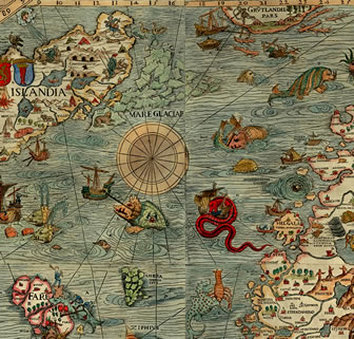
This is a course I designed and proposed for ENGL 2070, "Topics in Literature," an elective that can be repeated multiple times and that is different each time it is taught by a new instructor.
Course Syllabus and Readings
Course Description
Monsters—frightening, fascinating, and fierce—live on the borders of the “normal,” embodying cultural fears, anxieties, and taboos about cultural, racial, political, economic, religious, sexual, and gender difference. This course explores the theme of monstrosity and these monstrous “Others” in literature from around the world, with readings of novels, short stories, poetry, and plays paired with analytical secondary sources from The Ashgate Research Companion to Monsters and the Monstrous. Through an exploration of a variety of sources from around the world and from the classical era to today, this course develops students' skills in close reading, literary analysis, critical thinking, argumentation, research, and cultural understanding and competence. Students also read literature from a range of time periods, including ancient, medieval, and modern, and from Africa, South America, the Middle East, Asia, Europe, and North America.
Course Objectives
After this course, students should be able to:
Course Syllabus and Readings
Course Description
Monsters—frightening, fascinating, and fierce—live on the borders of the “normal,” embodying cultural fears, anxieties, and taboos about cultural, racial, political, economic, religious, sexual, and gender difference. This course explores the theme of monstrosity and these monstrous “Others” in literature from around the world, with readings of novels, short stories, poetry, and plays paired with analytical secondary sources from The Ashgate Research Companion to Monsters and the Monstrous. Through an exploration of a variety of sources from around the world and from the classical era to today, this course develops students' skills in close reading, literary analysis, critical thinking, argumentation, research, and cultural understanding and competence. Students also read literature from a range of time periods, including ancient, medieval, and modern, and from Africa, South America, the Middle East, Asia, Europe, and North America.
Course Objectives
After this course, students should be able to:
- understand and articulate the cultural and social uses of monstrosity
- understand and articulate the role of monstrosity in forming ethnic/national/cultural identity and cultural norms
- articulate how monstrosity has adapted to cultural change and how it functions in modern discourses
- articulate how cultural, racial, ethnic, disabled, gender, religious, and sexual Others are deemed “monstrous”
- articulate how the idea of the “human” is informed by the idea of the “monstrous”
- better empathize with various kinds of “Others”
- develop a more nuanced and informed view of non-Western cultures and non-Christian religions
- analyze fictional and poetic texts using the lens of monster studies
- better understand and use close reading techniques
- participate confidently in a literary seminar course format
- compose an annotated bibliography
- write a clear, effective thesis statement
- write a 6-8 page literary analysis paper which incorporates primary and secondary sources
- write an abstract
- verbally present and defend a literary analysis argument and address questions about it from their peers
